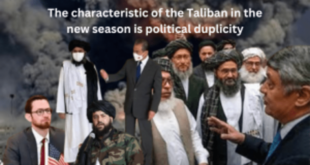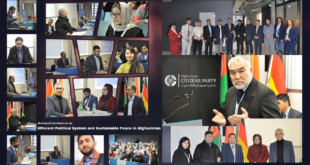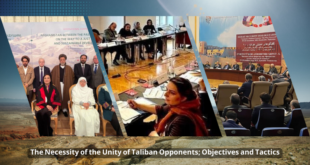Prepared by the Committee for Human Rights and Peace of the Afghan Citizens’ Party.
The international community has been striving since 2001 to reintegrate Afghanistan as a member of the global community, ready to assume human rights responsibilities at the national and international levels. While there have been numerous challenges along the way, efforts were made during the Republic period (2001-2021) and were accompanied by some successes. Considering the social and religious situation of the Afghan people, achievements were made in the areas of respecting fundamental rights, social freedoms, rule of law, and the establishment of oversight institutions. Although they were insufficient, and many ethnic and religious groups were deprived of some of their rights and faced discriminatory treatment, they could have been hopeful for the future. However, with the return of the unlawful and illegitimate Taliban group to power, all the achievements made were erased, and in many cases, the opposite of those achievements is being practiced.
In the past two years, the people of Afghanistan, especially women, girls, and various ethnic, religious, linguistic, cultural, and political groups have been deprived of their most basic rights. Women and girls, as half of the population, are still deprived of their fundamental rights, such as the right to education, work, religious and belief freedom, and even the freedom to travel and move around and access health services. Moreover, during this period, genocide and rights deprivation have continued in a systematic and targeted manner. The Hazara people are continuously killed due to their ethnicity and religion, and their ancestral lands are seized by the Kuchis with the support of the Taliban, and they are subjected to forced displacement. The political and judicial institutions of the Taliban are not independent of each other, and each one acts in the interest of the Taliban supporters in other matters.
What has happened in Afghanistan and continues to unfold is not only a systematic and targeted violation of human rights but also a serious threat to both national and international “peace and security.” In this report, we briefly address some examples of human rights violations and threats to peace.
Violation of the fundamental rights of women and girls.
Since the Taliban, through illegal and illegitimate means, have taken control of power, over time, they have attempted to eliminate or restrict the fundamental and basic rights of half of the society. They have disregarded women’s right to work, which is considered one of the fundamental human rights and is not in contrast with Sharia law. While they have not explicitly expelled women from work, in practice, they have imposed restrictions, such as the right to teach in schools and universities for female professors. The Taliban claim that they have not expelled them, but in reality, by not allowing girls to attend schools and universities, they have effectively eliminated the economic activities of women. It does not matter whether they have officially expelled them or not. Moreover, many female employees have been removed from government offices, and they have not granted permission for employment in domestic and foreign institutions, and those who were already employed have been ordered to be dismissed.
Furthermore, they have banned the education of girls beyond the sixth grade and in universities. Although they claim that they have not outlawed it and have only delayed it, these are all the Taliban’s words that they frequently use as tools during this period of power. Many clerics have explicitly mentioned the prohibition of girls’ education. Assuming that they do not know about girls’ education, in practice, the right to education for girls has been eliminated, as the Taliban will not provide the conditions for what they have not acknowledged.
The Taliban use “gender discrimination” against women and girls, depriving them of their most basic rights. All of the Taliban’s actions towards women and girls in Afghanistan are clear examples of crimes against humanity and should be subject to prosecution by the International Criminal Court and the United Nations.
Continuation of the genocide of the Hazara people
The Hazara people, as a specific ethnic and religious group, have been subjected to deliberate and systematic killings and forced displacement, particularly since the rise to power of Abdul Rahman Khan in 1880. The targeted and systematic killings with the intent of their destruction represent a clear example of the crime of genocide under the 1948 United Nations Convention on the Prevention and Punishment of the Crime of Genocide. Just between the years 1892 and 1893, more than 63% of the Hazara people were either massacred, declared infidels, captured, enslaved, or forcibly driven from their ancestral lands as part of a campaign to facilitate their devastation.
Following Abdul Rahman Khan, his descendants continued this policy through different means. For instance, Amir Amanullah Khan, despite having visited European countries and embracing modern thinking, continued the same ethnic policies toward the Hazara people. During his rule, he constituted laws that confiscated land ownership from various ethnic groups, including the Hazara people, and relocated Pashtuns from southern and eastern regions to the northern areas, further marginalizing the Hazara population.
The process of genocide against the Hazara people has continued under all subsequent governments, and even during the first Taliban regime (1997), between eight to twelve thousand Hazara individuals were massacred by the Taliban in just one week in Mazar-i-Sharif, or many of them were made to disappear. Prior to that, in the Yakawlang region in Bamyan, hundreds of Hazara people were systematically massacred due to their ethnic and religious identity.
The deliberate killings based on the ethnicity and religion of the Hazara people did not cease even during the republican period. During this period, communities and religious, cultural, educational, and healthcare facilities of the Hazara people were subjected to targeted attacks. In the recent era of the Taliban, several targeted suicide attacks were carried out on schools and religious and cultural institutions of the Hazara people, resulting in the mass killing of hundreds, including dozens of children and teenagers, in a short period.
Furthermore, the Taliban group, by aligning themselves with Pashtun and Kochi communities, engage in deliberate and systematic killings of the Hazara people. Repeatedly, the Hazara people are targeted in various locations, particularly in areas adjacent to Pashtun-inhabited regions, with the aim of facilitating their annihilation.
All the killings carried out against the Hazara people, based on their ethnic and religious identity, have been deliberate and systematic, with the aim of their annihilation. For this reason, the mass killings of the Hazara people represent a clear example of genocide under the 1948 United Nations Convention on the Prevention and Punishment of the Crime of Genocide, and they are subject to prosecution by the International Criminal Court (ICC) and the United Nations.
compulsory migrations
compulsory migrations, as an inhumane phenomenon, began during the reign of Abdul Rahman Khan in Afghanistan and has continued to the present day by various governments. Even during the reign of Amanullah Khan, who had apparently visited modern countries and appeared to be striving for the modernization of Afghanistan, he still adhered to ethnic governance. Therefore, he created the “Nizamnama Naqilin” (law), through which people from the Pashtun regions of southern and eastern Afghanistan, who were originally inhabited by Pashtuns, were transferred to other parts of Afghanistan where the main and indigenous ethnic groups were Hazara, Tajik, and Uzbek. For this reason, it was called the “Nizamnama Naqilin.” This process has intensified during the current Taliban era. The Taliban group strategically relocates Pashtuns to areas inhabited by Hazara, Tajik, and Uzbek people. They seize the ancestral lands of other ethnic groups by force and threat and transfer them to Pashtun control, even Pashtuns who belong to the Pakistani Taliban group and have come from there.
In Hazara areas, this process continues intensively, and the Taliban, through the creation of forged property documents, transfer the ancestral lands of Hazara people to Pashtuns’ ownership, particularly Kuchis, by the authority of their own court rulings or commissions composed of their own members. Taliban leaders have explicitly stated that Kuchis supported them during the war against the Republic government, and now they are rewarding the Kuchis and supporting their claims and demands. For this reason, the Kuchis claim ownership of lands belonging to Hazara, Tajik, and Uzbek people, and the Taliban also endorse this. They obtain ownership transfer approvals through threats, harassment, and the detention of landowners and grant them to Kuchis and Pashtuns. Examples of this occur daily in areas such as Bamyan, Daikundi, and Urozgan
Forced migrations and the seizure of the lands of native people are one of the instances of targeted human rights violations aimed at the eradication and expulsion of other ethnic groups in Afghanistan. Numerous reports have been published by national and international organizations, particularly by the United Nations Special reporter, which should be pursued by international bodies.
censorship of freedom of speech
During the Republic era, conditions were established for the activities of human rights defenders, journalists, social and political activists, who acted as social oversight institutions and disseminated information. However, with the return of the Taliban, due to their widespread and targeted assault on the fundamental rights of citizens, they are attempting to obstruct the reporting of human rights violations. For this reason, initially, they deliberately restricted freedom of speech and information, and then they shut down many of them. Specifically, from 2023, they have closed down dozens of media outlets and coerced others to publish news that aligns with their agenda. They have also threatened media organizations that if they publish news that is not in favor of the Taliban, their offices will be closed, and their staff will be punished. As a result, they have arbitrarily detained several media activists, and some of them are still in Taliban custody.
Currently, all the activities of human rights defenders, journalists, social and political activists are monitored by the Taliban, and any form of critical information exposes them to the risk of harassment, arrest, disappearance, torture, and even death. Therefore, there is a prevailing silence in the field of information, and only media outlets sympathetic to the Taliban spread propaganda for them.
repealing laws
During the Republic era, efforts were made in collaboration with the international community to create laws and oversight mechanisms for the rule of law. However, with the rise of the Taliban, all of these have been eliminated. The Constitution, as the primary law in the structures of modern governance, has been abandoned, and no other laws have replaced it, but it is claimed to be based on the principles of Sharia. These Sharia principles, as professed by the Taliban, have so far deprived half of the citizens of their rights and subjected the rest to various social and economic difficulties.
Furthermore, at the level of ordinary laws, fundamental laws such as civil law and the penal code are not enforced. The Taliban use Sharia in these matters as well. However, they have their own exclusive interpretation of Sharia and its rules. For this reason, the Taliban’s interpretation of Sharia has deprived half of the community of their basic rights. They apply the harshest, most restrictive, and most severe interpretation of Islam against citizens, even facing objections from Islamic societies in other countries.
Furthermore, during the Republic era, Article 131 of the Constitution recognized the Jafari as one of the official sects, and the Personal Status Law of the Shia Muslims was enacted to accommodate it. Therefore, matters related to the personal status of Shia Muslims were adjudged based on the mentioned law. However, the Taliban have repealed this law and claim to handle matters related to the personal status of Shia Muslims according to the Hanafi jurisprudence. This action is also in violation of the rights of Shia Muslims, particularly the Hazara people, as it is part of an effort to undermine their fundamental rights.
targeted killings
Since the Taliban unlawfully and illegitimately returned to power, they have intentionally targeted hundreds of individuals. Despite the Taliban’s declaration of amnesty, targeted killings continue. They systematically eliminate individuals who had military roles in the previous government, as reported by the United Nations special reporter.
In addition to former military personnel, there are multiple reports of killings of social activists and human rights defenders. Furthermore, killings of ethnic and religious minorities occur repeatedly. The Taliban claim that many of them have ties to ISIS and then proceed to eliminate them. This claim is made despite the fact that many of these individuals were active in significant positions within the Taliban. Therefore, there are reports that the Taliban eliminate their opponents by falsely linking them to ISIS, removing them from the political and social scene.
Therefore, in the absence of a rule of law and impartial oversight institutions, there are systematic and targeted killings by the Taliban, which can be considered instances of crimes against humanity or war crimes, especially in cases of killings accompanied by the torture of opponents, which has been widely reported. However, due to limitations in the dissemination of human rights violation reports, many of these incidents are not accessible to the general public.
The Monopoly of power
The Taliban group, through its consolidation of power, has eliminated the possibility of political participation for other political, ethnic, and religious groups. They have established a regime in which only their like-minded individuals and those who have played a role in numerous killings and explosions during the 21-year period of the Republic have a say. Consequently, human rights violations are carried out purposefully and systematically, and there is little opposition against them.
Despite international and neighboring countries’ pressures on the Taliban, they seem inclined towards monopolizing power within a particular ethnic group, even if it leads to mass killings, forced displacement, and deprivation of basic rights for the citizens. Thus, the power monopoly has resulted in systematic, purposeful, and widespread human rights violations against other political, ethnic, and religious groups.
In the Taliban’s monopolistic administration, a centralized administrative system prevails, which can lead to ethnic dominance. Therefore, they strongly support a centralized administrative system and can only see their own interests within this structure. Due to such a structure, local people and even local elites have no role in the administration of their region, contributing to the widespread human rights violations and making it impossible to report on these violations due to the power monopoly.
Furthermore, power monopoly can perpetuate conflicts, even in armed forms. Therefore, power monopoly can pose a serious threat to national and regional peace and security in addition to human rights violations. This monopolistic approach not only cannot paint a future of peace but indicates a vague and grim future, where the intensification of human rights violations is the only message.
Sheltering to foreign terrorist groups.
The Taliban group and its leaders are still on the blacklists of countries and the United Nations. For this reason, this group is still recognized as a terrorist organization. This terrorist group has close ties with other terrorist groups, such as Al-Qaeda, which was responsible for the September 11th tragedy and subsequent events. Currently, this group has sheltered to all like-minded terrorist groups within Afghanistan, and they pose a serious and far-reaching threat to the human rights of the people of Afghanistan and other countries. These terrorist groups can be a serious threat to other groups and ethnic and religious minorities in Afghanistan. Many of them (even some senior members of the Taliban) do not consider Shia Muslims as true Muslims, and as a result, they have been responsible for targeted explosions and killings of the Hazara people and their forced displacements. This may continue to happen on a larger scale.
Therefore, Afghanistan has become a hub for international terrorists whose activities are aimed at violating human rights on a national and global scale. This issue requires serious attention from national and international organizations to control it before widespread atrocities occur.
Furthermore, the presence and activities of such groups pose a threat to peace. With the presence of these groups in Afghanistan, not only will peace in Afghanistan be unattainable, but it can also be a serious threat to regional and global peace and security.
 حزب شهروندان افغانستان وبسایت رسمی حزب شهروندان افغانستان
حزب شهروندان افغانستان وبسایت رسمی حزب شهروندان افغانستان


